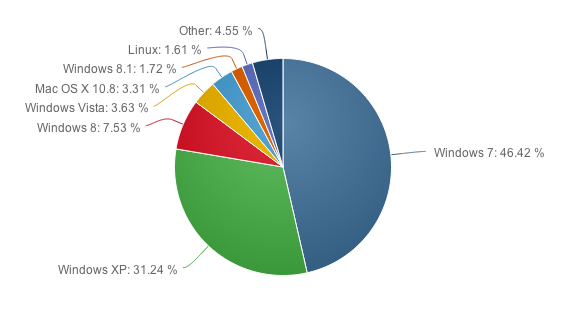Microsoft has quietly stopped serving security updates to Internet Explorer 11 (IE11) on Windows 7 according to an article on Computerworld:
Microsoft strips some Windows 7 users of IE11 patch privileges – Computerworld
Microsoft has quietly stopped serving security updates to Internet Explorer 11 (IE11) on consumer and small business Windows 7 PCs unless the customer has successfully applied an April update for the browser.
The requirement and associated patch stoppage were similar to those Microsoft mandated for Windows 8.1 when it told customers they had to migrate to Windows 8.1 Update by June 10 or lose their patch privileges. The Windows 7 requirement, however, affected only IE11, Microsoft’s newest browser, not the operating system.
This type of thing is very hard to understand. Why would Microsoft do such foolish things. Why would they cut off their nose to spite their face by making things so difficult for their users? Windows Update should provide what is needed as it is needed. Period. If they can’t figure out how to do that, maybe they need to get someone in there to help them do the updates.
At this rate, they will be causing more people to move from Windows to other platforms like Mac and Linux. Do they not realize this? Not to mention that people need their security updates not just for the operating system but for the browser. If they want to maintain market share with their IE browser, they are showing a very strange way of doing that by cutting off the very much needed security updates because one hasn’t installed as yet. Why is it not installed? That is what should be addressed here.
“All future security and non-security updates for Internet Explorer 11 require you to have update 2919355 or update 2929437 installed in order to receive updates (emphasis added).”
With the way that malware is attacking Microsoft Windows, I can not see how they can feel it is OK to do this as well as stopping supporting Windows XP when it as still garnered nearly a third of all users world wide even after security update support was ended for Windows XP. As of today, June 15, 2014 it still garner’s over 25% or 1/4 of the total global market:
May 2010 Windows 2000 fell below 5% and end of life for Extended Life Support of Windows 2000 was July 10, 2010 so WINDOWS 2000 FELL below 5% TWO MONTHS BEFORE SUPPORT ENDED.
Then the Windows 8.1 Update 1 fiasco and now this IE11 fiasco.
There is something very anti-customer about all of this, don’t you think? Especially in light of the fact that Windows is the most high profile target for malware purveyors because it garners the greatest marketshare.
I personally feel Microsoft has a made a BIG mistake ending support for Windows XP when it still holds slightly over 25% or 1/4 (one quarter) of the total global marketshare as shown above. And they are continuing to make security missteps for Windows 8.1 and Windows 7 users now too.
I do not understand. Microsoft has never been this way before in it’s long history of being customer centric. It just does not make sense.







You must be logged in to post a comment.